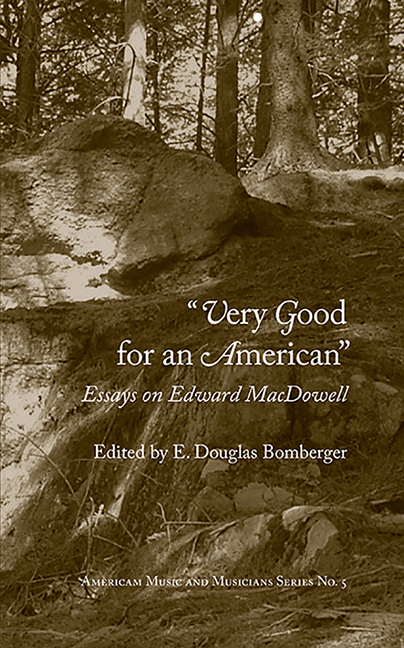
- This book is no longer available to purchase from Cambridge Core
- Publisher:
- Boydell & Brewer
- Online publication date:
- April 2018
- Print publication year:
- 2017
- Online ISBN:
- 9781576472712
- Subjects:
- Music, Nineteenth-Century Music

This collection of essays explores topics of relevance to understanding Edward MacDowell (1860-1908) and his music. At the height of his career, MacDowell was widely recognized as America's leading composer. He had come of age during an era when the infrastructure of concert music in the United States was expanding rapidly, as outlined in Javier Albo's description of historical concerts in New York during his childhood. MacDowell came from an unusual background that resulted from the interaction between his father's Quaker roots, described in Douglas Bomberger's essay, and his mother's ambitious goals. He benefited from the early advocacy of his mother's best friend, the Venezuelan pianist Teresa Carreño, whose support of MacDowell is explored in Laura Pita's essay. He studied for two years in Paris and then spent a decade in Germany, studying with Liszt's pupil Raff and establishing his career. The crucial influences of Wagner and Liszt on MacDowell's style are explored in essays by Francis Brancaleone and John Graziano. He lived in Boston from 1888 to 1896, during which time he was in close contact with George Whitefield Chadwick, an American contemporary whose career as an organist is examined in an essay by Marianne Betz. MacDowell's growing body of works for piano and orchestra earned him the reputation of America's most important young composer, which led to his appointment as first professor of music at Columbia University in 1896. His contributions as a teacher were ended after eight years by a public dispute with President Nicholas Murray Butler, explored in Michael Joiner's essay. Columbia continued to feel the tension of the issues raised by MacDowell and Butler for generations, as demonstrated in Mark Radice's discussion of Chou Wen-chung's experience on the faculty from the 1960s through the 1990s. After MacDowell's death at the age of forty-seven, his widow Marian developed their Peterborough, NH, farm into an artists' colony that is still prominent today. Robin Rausch's essay, richly illustrated with photos from the Library of Congress, shows how she gained support for her efforts through summer pageants.
"Very Good for an American was inspired by a symposium at Elizabethtown College, Pennsylvania.Bomberger, author of the MacDowell volume in the Master Musicians Series (OUP), notes how the melodist, overfamiliar today for To a Wild Rose, was not always universally respected...Now, piano lovers agree that MacDowell's works are highly interesting and individualistic. Benjamin Ivry, INTERNATIONAL PIANO "
 Loading metrics...
Loading metrics...
* Views captured on Cambridge Core between #date#. This data will be updated every 24 hours.
Usage data cannot currently be displayed.